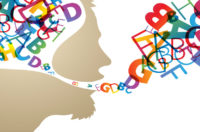Daniel Tammet was born in London. His mother spoke English and he grew up in an English-speaking environment. Yet to his ears the English language was an alien language. Words and sentences were a puzzle the young boy could not figure out. Daniel was an autistic savant. He was a self-confessed misfit in a world of words. He was also a mathematical genius. Daniel felt, thought, and dreamed in a private language of numbers.
One Word Spoken All Over the World
When you listen to someone speaking a language you don’t understand, can you pick up any meaning? Most people can, because a lot of body language is universal, and up to 90% of all communication is nonverbal. Most of spoken language is not universal though, and there are very few words, which are the same across all languages. Modern linguists are beginning to study these universal words now. Image by: qthomasbower License: (CC BY 2.0)
How Self-Aware Are You?
On Jan 6, 1995, McArthur Wheeler boldly robbed two banks in broad daylight with no disguise. According to an article in a local newspaper, “At 5 feet 6 inches and about 270 pounds, bank robbery suspect McArthur Wheeler isn’t the type of person who fades into the woodwork.” He made no attempts to hide his identity and even looked directly into the security camera and smiled. By 11:00 at night, his picture was all over the news, leading an informant to identify Wheeler to the police. Within an hour, he was in jail. As he was being arrested, the shocked Wheeler said, “But I wore the juice!”
Can The Language You Speak Make You Healthier?
According to research on language and culture, your health and even your finances are related to the language you speak. Linguists have long known that language can directly influence your perception of the world. For example, in the Kook Thaayorre language, there are no words for left and right. There is no way to explain where something is without using the words north, south, east, and west. Because of this, these people have an innate understanding of which way is north at all times. In some languages, there aren’t different words for blue and green. Speakers of these languages have trouble distinguishing between the two colors.
Fear of Rejection
Jia Jiang was the founder of a small tech company in 2012 when he got rejected by an investor. Traumatized by this rejection, he was left with a sinking feeling in his stomach and was angry and insecure. Jiang wanted to give up on his company, but instead, he decided he needed to build his confidence. If he was going to be successful, he needed to get comfortable with failure and rejection. He needed rejection therapy.
Do You Need To See A Doctor To Speak Better English?
The English idiom tongue-tied describes someone who is speechless. Originally coined by Shakespeare, the expression is still commonly used today. There are many reasons that people sometimes feel tongue-tied, and being a native English speaker or an English student has nothing to do with it. Embarrassment, nervousness, surprise, or just plain old shyness are some of the psychological causes for feeling tongue-tied.
Is Speaking English Risky?
You might not realize it, but many see speaking in English as risky. They fear the risk of making mistakes or looking foolish. Just like the Extreme Kidnapping though, there’s no real danger involved in making mistakes. What about you? Do you think making mistakes in English is risky or embarrassing? This is important, because fear of failure will stop you from becoming a more fluent English speaker. How can you reframe the way you think and feel when speaking English?
Adapted from an image by Peter Jackson (CC BY 4.0)
A Bad Dancer’s Guide to English
The message for me is being comfortable looking foolish is a path to greater freedom and happiness in your life. This is especially important for language learners, because everyone makes mistakes and everyone looks foolish sometimes. The people who are comfortable with those mistakes, and don’t care what other people think, are the ones who will learn the fastest.








